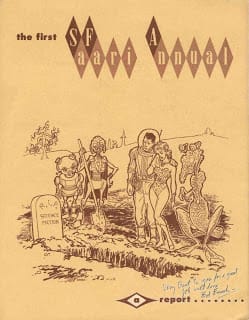Who Killed Science Fiction? won the Hugo Award for Best Fanzine in 1961. The Fifties were rife with talk about the death of science fiction, and Earl Kemp’s symposia of so many sf pros and prominent fans summed it all up.
“When man entered the Space Age two years ago, the writers and editors of science fiction, who had so long been living in this new age, hoped for a fresh surge of reader interest, an expression of gratitude for accurate prophecy in the past and of interest in the possible accuracy of other, as yet unfulfilled prophecies.
“It seemed a logical enough expectation, but it was a fallacious one. The new readers did not arrive—to some extent, at least, because they were put off by the cry of the press (never happier than when it can claim a miracle and coin a cliché): ‘Science has caught up with science fiction!'”
. . . “But facts are impotent against loud and frequent assertion. Readers believe that science has ‘caught up’; and somehow the very fact of s.f.’s accurate prophecies turns into a weapon against it, as if a literature of prophecy should become outmoded the instant one of its predictions was fulfilled.”
Note that in full context, Boucher was not claiming that SF was a literature of prediction, only that sometimes it turned out that way.
